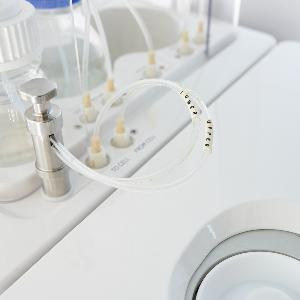The MSBioLMU Metabolomics Service Unit routinely performs GC-MS and LC-MS analyses of small molecules. Several instruments are available for analysis: two GC-TOF-MS and a UPLC-ESI-QTOF combination. The existing equipment allows a wide range of metabolites to be identified and quantified. These include amino acids, organic acids, sugars, fatty acids, glucosinolates, indoles, phenylpropanoids, flavonoids, lipids, and porphyrins.
The service offering includes sample measurements, consulting on experimental design, and data analysis. Analysis is performed using various programs and compound libraries.
Sample Preparation
Before sending any samples, establish contacts to the service unit to check the machine run time capacity and confirm the correct receipt of your samples. To ensure the degree of purity required for all consumables the sample preparation will be done exclusively in our laboratories. Methods of extraction will be adapted to the customer needs.
- Ask the service unit for help in experimental design, if necessary.
- Prepare at least 5 biological replicates (5 mg dry weight or 50 mg fresh weight, some extra material for testing is welcome)
- Always use the highest grade reagents and consumables available.
- Wear clean and powder-free gloves and avoid skin contact.
- Harvest fast as possible! The metabolism needs to be stopped immediately by freezing in liquid nitrogen (solid sample) or adding ice cold methanol (liquid sample). Ask the MSBioLMU support in advance. If necessary lyophilise the sample. Ask in advance!
- Store the sample at -80°C.
- Send the samples on dry ice or lyophilised only.
- Contact the MSbefore sending any samples to ensure correct receipt.
- Fill out the MSBioLMU Sample Submission Form (PDF, 102 KB) and submit it together with your sample (rooms F02.17 or F02.021)
- Please consider the MSBioLMU in acknowledgements.
Data Exploration
GC-MS data sets are evaluated using device-specific programs, as well as, the TagFinder software tool. The TagFinder employs spectra and retention time indices (RI) of the Golm Metabolom Database (GMD) for metabolite identification. LC-ESI-QTOF-MS data sets are evaluated by MassLynx V4.1 and further freeware tools.
Technical Equipment
GC-MS
The service unit has two Pegasus HT GC-TOF-MS (Leco) equiped with an autosampler (automated derivatisation/injection) to perform gas chromatography. This ensures a high comparability of the derivatisation process combined with minimised time offset between sample preparation and measurement. Furthermore, both GC machines have two different injection ports to enable hot and cold injection. A 30 m VF-5 ms column + 10 m guard column (Agilent Technologies) is routinely used.
LC-MS
LC analyses are performend on a UPLC-QTOF combination (Premier, Waters). The QTOF has an ESI source and different types of columns are available.
Costs
Information on pricing and user conditions is provided here (PDF, 152 KB).
Contact:
Organisation
Dr. Martin Lehmann
Technische Assistenz
Beate Minov
Räume: F02.017 und F02.021

